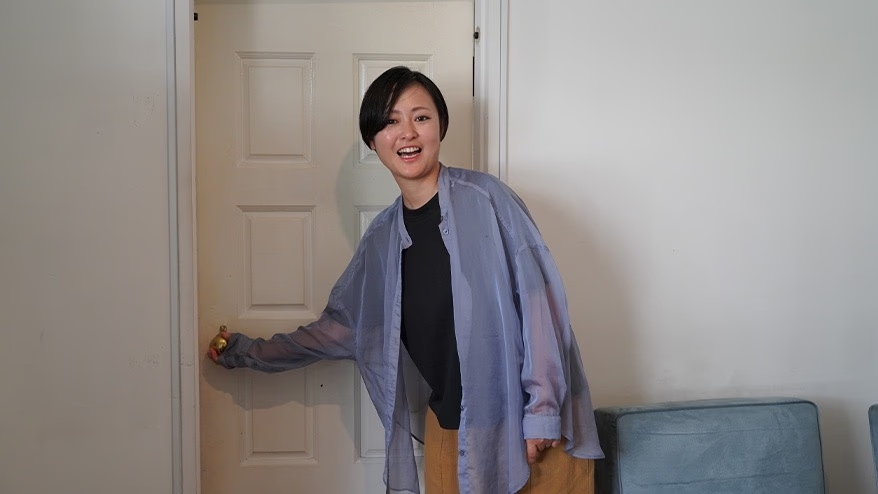こんにちは、京都で暮らすライターの杉本です。
秋の観光シーズンが到来、なんでもない平日も電車が混みはじめました。
今回の「自由と責任」は、ディレクターの加倉井宏美さんにインタビューしました。
加倉井さんのお名前はよく聞いていたけれど、お会いするのは初めて。そんなときは、過去記事を読むのですが、どの記事も面白くて前のめりになりました。特に、加倉井さんが書かれた「聞き方、伝え方で私が心がけている5つのこと」は、文章の書き方にも通じる話だったから、気がつけばただの読者になっていました(リサーチしてたはずなのに)。
モノサスに入社して10年間、どんなふうに仕事の内容と働き方は変化してきたのか。子どもが生まれてからは、仕事と家庭のバランスの取り方についてなど、ゆっくり聞かせていただきました。撮影は、ものさすサイト事務局の山田真綺さんです。
「ほめてくれる面接」に心をつかまれて
杉本 ものさすサイトへの登場はひさしぶりですので、改めて入社したいきさつを聞いてもいいですか。
加倉井 もともと、代々木オフィスの近くにある文化服装学院で服飾を学んだのですが、卒業後は販売員になっちゃったんです。でも、ものづくりが好きだという気持ちはずっと残っていたし、ものづくりをする人は自己表現の場としてWebサイトが欲しくなるから、需要があるんだなと思ったんですよ。パソコンは好きだったし、Web制作会社の求人を探すなかで「いいな!」と思ったのがモノサスでした。
杉本 「いいな!」のポイントはなんだったんですか?
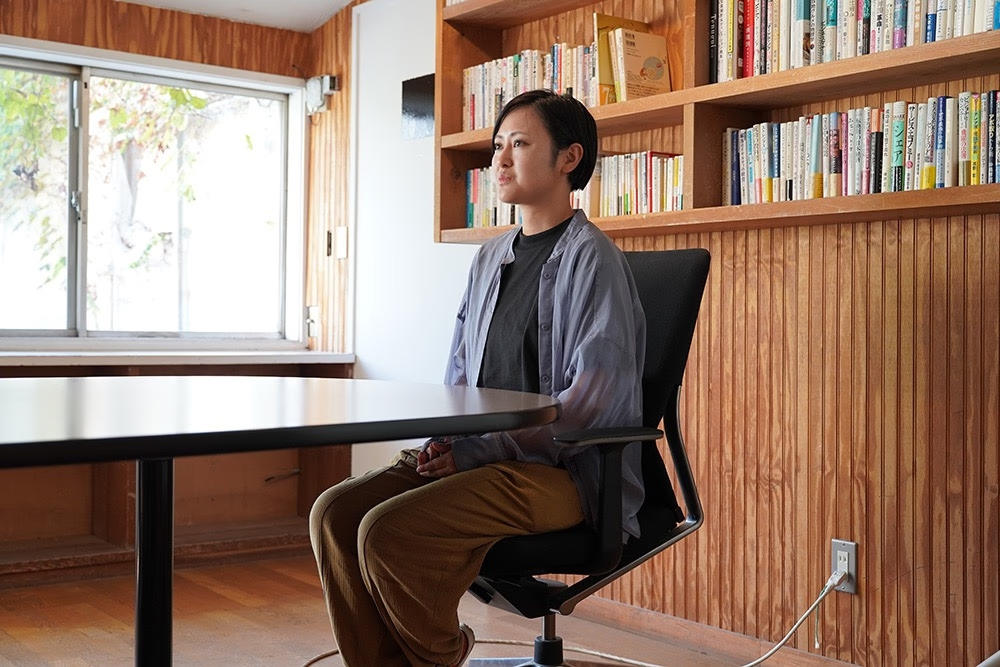
加倉井 めちゃくちゃほめてくれる面接だったんですよ。自分で撮った写真とWebデザイン案を印刷してポートフォリオを持って行ったら、河原崎(平)さんと栗原(功)さんが「すごく写真もいいね」って言ってくれて。「いずれ紙媒体もやってみたい」って言ったら、河原崎さんも「業務の振り幅としていいんじゃないかな」ってとても共感してくれました。面接後、友だちに「あの会社に絶対入りたい!」って話した記憶があります。
杉本 めっちゃいい出会いですね。入社したのは何歳のときですか。
加倉井 23歳で、当時は最年少でした。同期入社は、松永(悟)さんと香川(祐太郎)さん、最初の上司は河原崎さんでした。入社して1週間後くらいに、林さん(前代表)が庭で突然お肉を焼きはじめたんですよ。「そんな会社なんだ、すごーい!」と思いながらちょこっとだけ顔を出したら、永井(智子、副社長)さんがやってきて「どお?うちの若い子。入ったんだけど、どお?」っていろんな人に言いまくっていたのは覚えています。永井さん、若い女子が入るとだいたいそういうこと言うので。そのなかにのちに結婚することになったパートナーもいたと思います。
杉本 永井さん、うれしかったんでしょうね(笑)。しかも、未来のパートナーとの出会いもあったなんてドラマチックだなぁ。
デザイナーからディレクターに全振りする
杉本 仕事に話を戻すと、Web制作は未経験で入社したんですか。
加倉井 まったく。前職を辞めて半年くらい、独学でHTMLを書いたりはしていたのですが、CSSが入ってくるとちんぷんかんぷんで。入社した頃は「ここからここまで差し替えてください」とか、テンプレの指示をもらったうえで作業していました。Webサイト運用の部署に入ったけれど、志すところはやっぱりデザイナー。ただ、びっくりするほど自分のセンスがないことに挫けてしまって。でも、アパレルの経験もあったのでお客さんへの対応はすごく評価してもらっていて、永井さんには「早めにディレクターとして舵を切った方が楽だよ」と言われていました。
そのときはまだ「デザイナーをやりたいんだけどな」という気持ちがあったんですけど、なかなか自分が納得できるものができないし、年を追うごとに「自分はディレクターの方が向いてるな」と腑に落ちてきたので今はそっちに全振りしています。
杉本 ディレクターさんは、たくさんの人と関わるお仕事だし、ときには「できていますか〜?」ってお尻を叩かないといけない。気を使うお仕事でもありますよね。
加倉井 言いづらい場面でもできるだけ物腰柔らかく言うようにしています。「忙しいと思うんですけどどうですか?」「ちょっと、お客さんもそろそろこう言われていますけど、どうですか?ここらへんでねじこめますか?」って。難しい場合は、お客さんにも相談します。無理にねじこんでクオリティ低いものが上がってきたら迷惑をかけてしまうので、「どうしても今はリソースの調整が難しいので、申し訳ないんですけどあと3日ください」と伝えることもありますね。
できないことをきちんと伝えることもまた、お客さんとの友好関係を築くうえでとても大切なやりとりだなと思っていて。アパレルの時にお世話になった店長に「お客さんを育てることも必要だよ」って言われたことがずっと記憶に残っているんです。黙って受け入れ続けるとお客さんはそれでいいと認識されるので、無理なときもあることをわかってもらえる空気感は出したいなと思っています。
杉本 舵取りですね。リソースの調整をしたり、お客さんと交渉したりして差配をするのは苦手ではない?
加倉井 そうですね。抱えている案件のなかで優先度を見極めて、押し込んだり優先度を上げたりするのは、パズルをはめる感覚に近いのかも。それはわりと好きなのかもしれません。
7年担当した大型案件を手放して出産へ
杉本 ご結婚されたときは何歳だったんですか。
加倉井 入社して4年後、27歳のときです。そして、ちょうど30歳になって2日後に出産しました。
杉本 3年前に産休・育休に入られて、2024年1月に復職されたと伺いました。
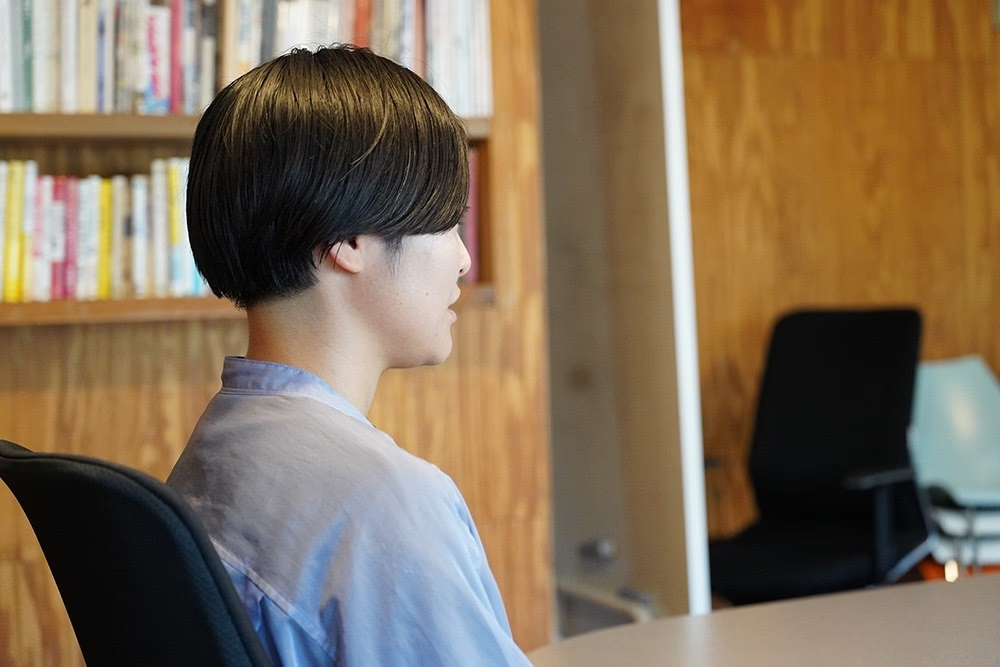
加倉井 周りの人に大変ご協力いただいたのもあって、有給もきっちり消化しつつ3年休みました。入社してから7年間、私と松永さんがふたりで担当していた大型案件があって、営業担当の奥山(秀野)さんは私がなかなか仕事を休める状況にないと認識してくれていたんですけど。ちょうど会社のメンバーが異動するタイミングで、児嶋(いずみ)さんが案件担当者を引き継いでくれることになったので、これで安心してプライベートの時間をつくれるなと思っていた矢先に軽く病気をしたんですね。
自分もいつまでも健康でいられるかどうかわからないと思うと、急に子どもがほしくなったのもあって。仕事を離れられて休める状況になったときに、タイミングよく子どもを授かることができました。
杉本 案件担当者として、休んで会社に迷惑をかけられないと考えて、お子さんのタイミングを考慮されていたところも?
加倉井 私はビビりなところもあって、自分もまだまだ未熟なのに子どもを産んで育てる自信がなく、踏み込めなかったところもあります。それこそ、毎朝遅刻ギリギリまで寝て、夜遅く帰って来る日もたくさんあるなかで、どうやって子どもを育てるの?って疑問もあって。自分が案件を離れたら、一緒に担当している松永さんの負荷が高くなりすぎることも心配で、なかなか離れる気になれなかったというのもありましたね。
奥山さんは、たぶんそれを天から見ていたんでしょうね。児嶋さんがこの案件を担当できる状態になったところで声をかけてくださって。そこで一気に流れが変わりました。児嶋さんなら鬼に金棒です。
杉本 人によっては出産で仕事を離れることにストレスを感じる方もいるようですが、一線を離れる寂しさはありましたか?
加倉井 むしろホッとしました。7年間ずっとプレッシャーに耐え続けていたので、リセットされる清々しさはすごかったです。最高に安心できる児嶋さんと、当時は新人だった原田(礼)さんという強力な助っ人に任せられるという状況を会社につくっていただきました。
家庭ではディレクションが通用しない?
杉本 産休・育休された3年間はどんなふうに過ごしていましたか?
加倉井 朝7時に起きて、お掃除して、朝ごはんを食べて公園に行って、12時に帰ってきてお昼を食べてお昼寝をしてーーという頭のなかのディレクションがまったく通用しないから、ストレスを感じることもあったんですけど。日に日に子どもが可愛くなってきて。信頼できる保育園に預けられたので安心はしているけれど、離れるときはつらかったです。ずっとふたりの世界があったのに、「私の知らない息子の世界ができるんだ」と思うと「その世界知りたい!今、何しているかなー」って毎日思います。
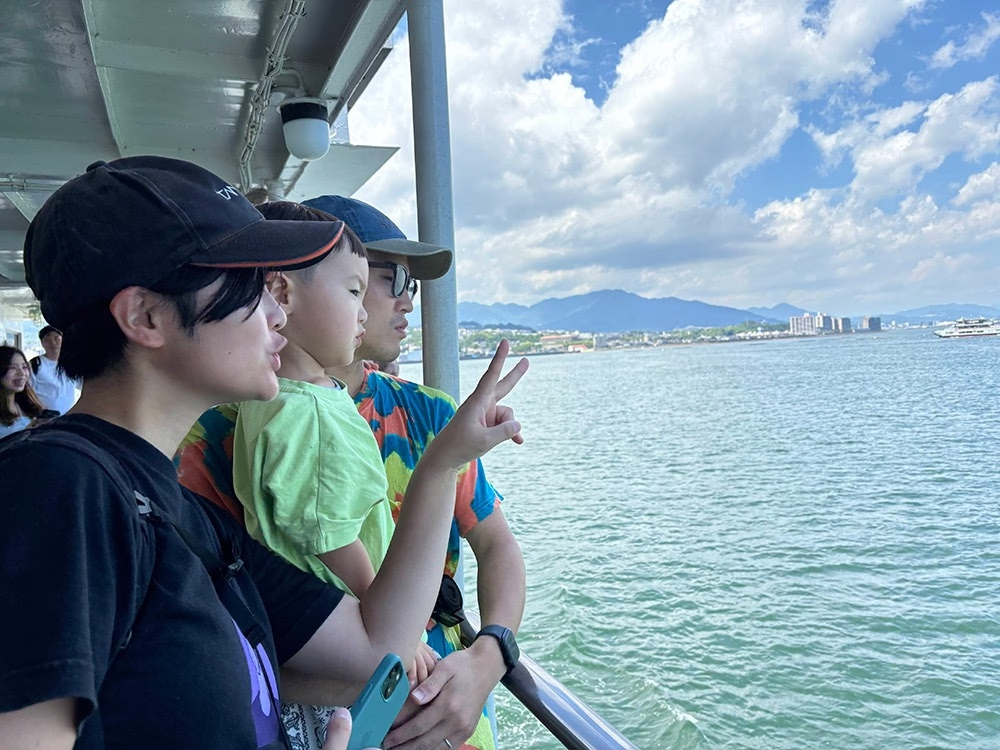
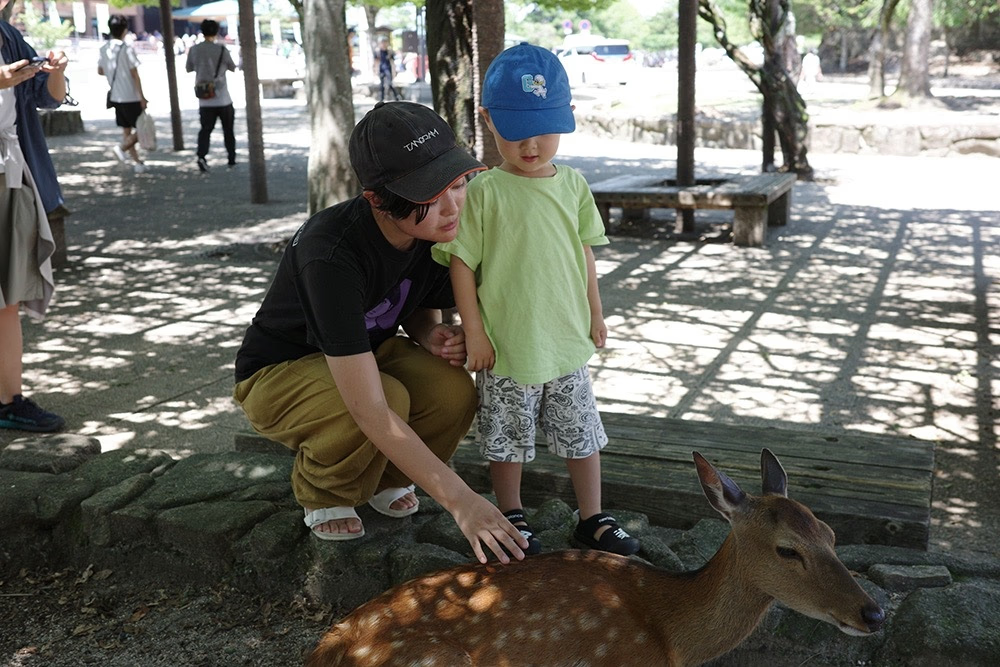 モノサスの社員旅行にも家族で参加。
モノサスの社員旅行にも家族で参加。
杉本 復帰後の勤務はどんなふうに?
加倉井 時短で週120時間にしてもらっていて、コアタイムは9時から16時。週一回は代々木オフィスに出社しますが、基本はリモートワークです。何かしら、子どものイベントや病気で休んでも、そのくらいの時間は働けるのでちょうどいいです。休んでいた間に、担当していた大型案件に関わる人たちが多くなっていて、「ちょっとお願いしていいですか?」と言いやすくなりました。
杉本 ご自宅で仕事をしていると、家事や子育ての時間との切り替えは難しくないですか。
加倉井 子どもを保育園に送り迎えするとき、車の運転中に切り替わっている気がします。でも、以前より責任を軽くしていただいているので、そこまで根を詰めて切り替える必要もないのかもしれません。
杉本 パートナーも同じ会社で働いておられますが、家事も分担されているんですか?
加倉井 復帰したら、何も言わなくても急にお風呂掃除とか食器洗いをやるようになりました。彼は「やってよ」というとやらないというか、納得して腑に落ちないと動かない人なので、黙って状況を見ていました。週に一回、パートナーが子どもを見守る日もあるので、そのときにも動いてくれています。
ディレクターの仕事はパズルを完成させる感覚に近い
杉本 ディレクターの仕事のおもしろみ、楽しさってどんな感じですか?
加倉井 今は、納期の短い案件をたくさん担当していて。ディレクターは、案件管理のはじまりとゴールを見るんですけど、そのゴールをぽんぽんぽんってたくさんクリアするのが楽しいです。たとえるなら、テトリスみたいなイメージです。案件が起票された時点で、ボリューム感や難易度、要素、誰が必要なのかを確認してピースの大きさを見て、スケジュールにパーツを当てはめていって、一つひとつクリアしていくみたいな。私は怖がりだし慎重派なので、先の見えない重い案件は「本当に終わるのかな」とプレッシャーから夢にも見てしまうんです。短い案件はゴールが見えやすいので得意ですし、おかげさまで今はとても楽しいです。
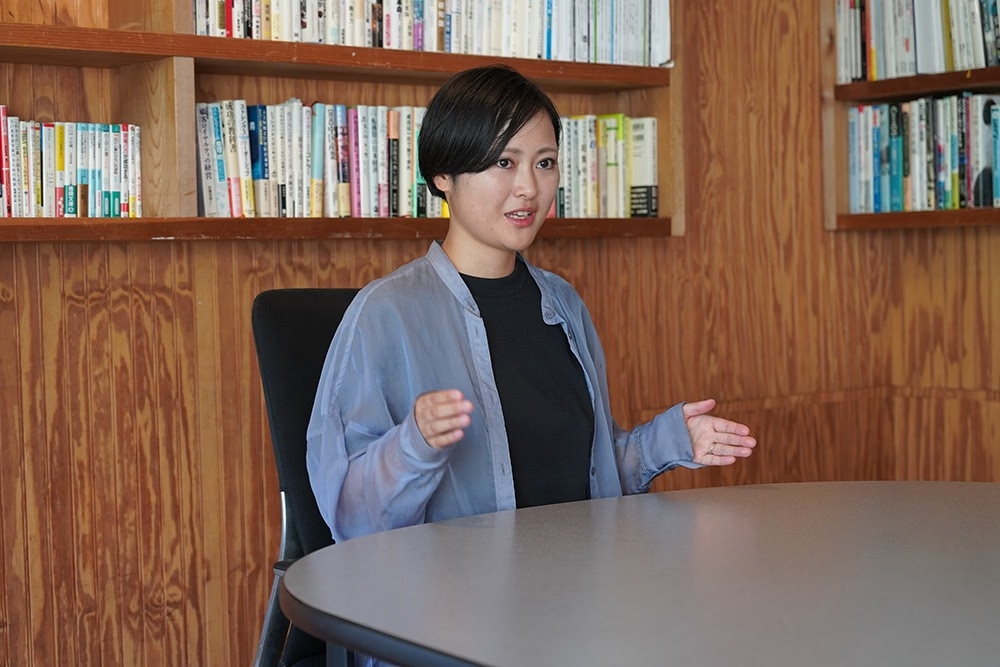
杉本 これから、モノサスでの仕事以外も含めてやってみたい仕事はありますか?
加倉井 もともと生まれも育ちも茨城の田舎なので、自然に関することには興味があります。実家の周りは一面畑で、何もない田舎が嫌で出てきたんですけど、帰ると深呼吸できる環境なんですよね。キャンプも好きだし、最近はSUPも好きです。観葉植物を育てていて、園芸屋さんのメディアやお花屋さんのSNSでフラワーアレンジメントを見るのも好きなので、何かしら自然や植物に関わる仕事ができると楽しいのかなと思います。
NHKの朝ドラ『ひよっこ』(2017)を思い出してしまいました。茨城県北西部の村に生まれた、有村架純さん演じるヒロインが集団就職で上京して、行方不明になったお父さんを探す物語。加倉井さん、ちょっと有村架純さんに似てる気がして。
それはさておき。
23歳で入社して、会社で出会った人と結婚して、子どもが生まれてまた仕事に戻ってきて。加倉井さんにとってモノサスは、人生の舞台なんだなと思いました。そして、モノサスの側もメンバーの人生に合わせて動いていて、メンバーのみなさんはお互いの人生を支え合っていて。モノサスで働く人たちの仕事と暮らしがとても近い感じがするのは、きっとそういうことなんだろうなと思います。
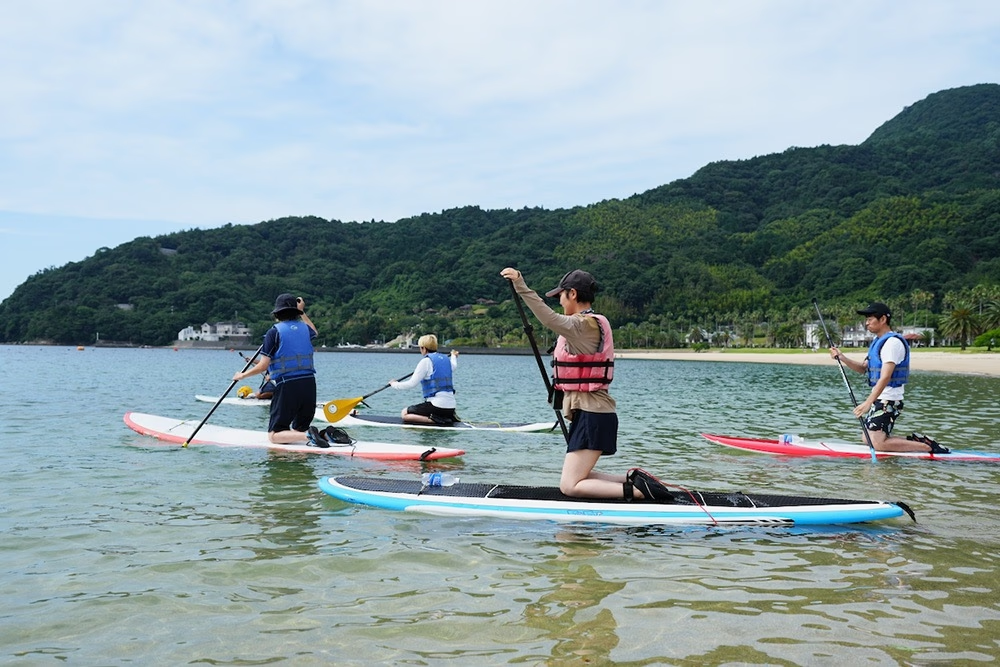 社員旅行で訪れた、モノサスのサテライトオフィスがある周防大島でSUPにチャレンジする加倉井さん
社員旅行で訪れた、モノサスのサテライトオフィスがある周防大島でSUPにチャレンジする加倉井さん
